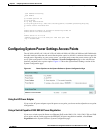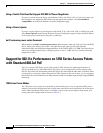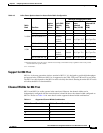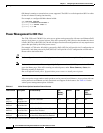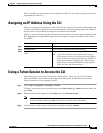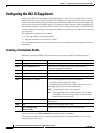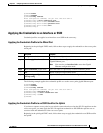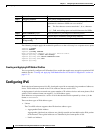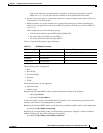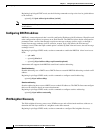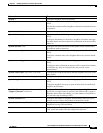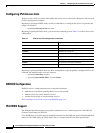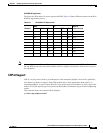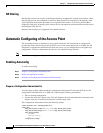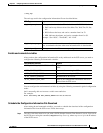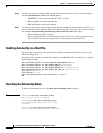
4-29
Cisco IOS Software Configuration Guide for Cisco Aironet Access Points
OL-30644-01
Chapter 4 Configuring the Access Point for the First Time
Configuring IPv6
Link-Local Addressses are automatically configured on interface using link-local prefix
FE80::/10 (1111 1110 10). The interface identifier is in the modified EUI-64 format.
• Anycast can be used only by a router and not the host. Anycast addresses must not be used as the
source address of an IPv6 packet.
• Multicast address is a logical identifier for a group of hosts that process frames intended to be
multicast for a designated network service. Multicast addresses in IPv6 use a prefix of FF00::/8
(1111 1111)
IPv6 configuration uses these multicast groups:
–
Solicited-node multicast group FF02:0:0:0:0:1:FF00::/104
–
All-nodes link-local multicast group FF02::1
–
All-routers link-local multicast group FF02::2
Table 4-6 lists the IPv6 address types and formats.
The following modes are supported
• Root
• Root bridge
• Non Root bridge
• Repeater
• WGB
The following modes are not supported
• Spectrum mode
• Monitor mode
Beginning in privileged EXEC mode, use these commands to enable tie ipv6 address
–
ap(config)# int bv1
–
ap(config-if)# ipv6 address
A link-local address, based on the Modified EUI-64 interface ID, is automatically generated for the
interface when stateless autoconfiguration is enabled.
Beginning in privileged EXEC mode, use the following command to enable stateless autoconfiguration:
ap(config-if)# ipv6 address autoconfig
Beginning in privileged EXEC mode, use the following command to configure a link local addreess
without assigning any other IPv6 addressesto the interface:
ap(config-if)# ipv6 address ipv6-address link-local
Table 4-6 IPv6 Address Formats
IPv6 Address Type Preferred Format Compressed Format
Unicast 2001:0:0:0:DB8:800:200C:417A 2001::DB8:800:200C:417A
Multicast FF01:0:0:0:0:0:0:101 FF01::101
Loopback 0:0:0:0:0:0:0:1 ::1
Unspecified 0:0:0:0:0:0:0:0 ::



